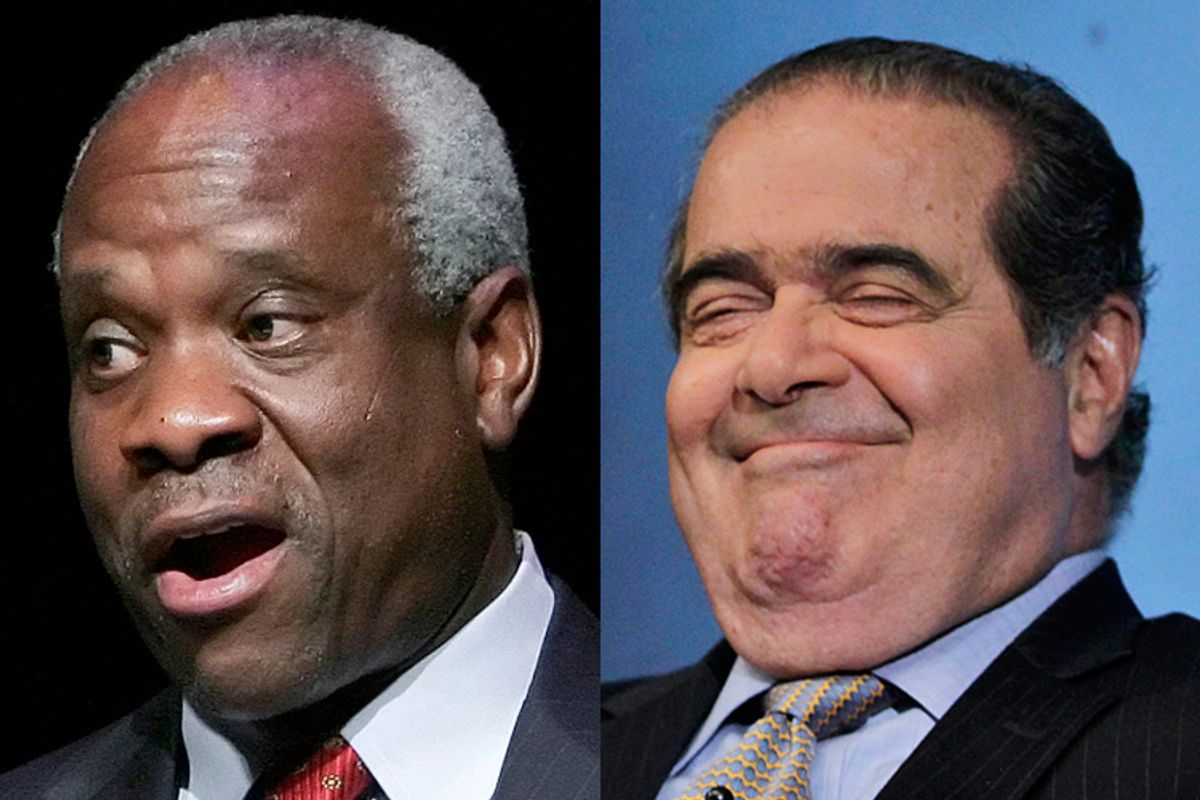Update: Sure enough, four of the Roberts Five cast dissenting votes in the DOMA case that are completely impossible to reconcile with the legal principles they asserted in Shelby County.
Original post:
Later this morning, the Supreme Court is expected to hand down its decisions in the key marriage equality cases. After yesterday’s performance by the Court, we can no longer be surprised by historically bad jurisprudence.
The voting rights ruling it issued yesterday, Shelby County v. Holder, is one of the very worst Supreme Court decisions of all time. Leaving aside the practical effects of the Court’s holding, which are likely to be awful (Texas has already won the race for “first state to enact a change to its voting laws that wouldn’t have been approved by the federal government if the Voting Rights Act could still be enforced”), the opinion is a travesty as a matter of basic legal reasoning.
The easiest way to explain Justice Roberts’ opinion to non-lawyers is by analogy. Suppose, hypothetically speaking, that in 1965 the drinking age in 41 states had been 21, while in nine states it was 18. Suppose further that alcohol-related traffic deaths involving teenage drivers were three times higher in the states with the lower drinking age.
Now suppose Congress passed a statute requiring any state that had an unusually high percentage of traffic deaths involving teenage drunk drivers to raise its legal drinking age to 21. Not surprisingly, the nine states in which the drinking age is 18 would all fall into this category.
Now imagine this hypothetical legislation is remarkably successful. Alcohol-related traffic deaths involving teenagers plunge in all nine of the affected states. Congress therefore renews the law on several occasions, and on each occasion the Supreme Court assures Congress, in decisions dealing with challenges to the law, that the law is perfectly constitutional.
But then something remarkable happens: Suddenly the Supreme Court announces that the law is unconstitutional after all. Its reasoning: The law was constitutional when it was passed, because experience has shown that requiring a higher drinking age was a rational legislative response to the problem of alcohol-related deaths involving teenaged drivers. Yet it is no longer constitutional, because the law has worked so well!
It’s “unfair,” you see, to “discriminate” against the nine states that had lower legal drinking ages, because those states now have roughly the same rate of alcohol-related traffic deaths involving teenagers as the states that voluntarily enacted higher legal drinking ages. So the former states should be able to lower their legal drinking ages, since the problem the legislation addressed has been solved.
Some of you must suspect that I’m exaggerating. Surely no one could make such an obviously absurd argument. Is this not like arguing that a vaccine that protects against an illness is no longer necessary, because those who have been given the vaccine do not develop the illness?
The decision in Shelby County is actually more nonsensical than even this outlandish hypothetical suggests. What the Roberts Five actually held is that it’s not merely a bad idea, but actually irrational, for Congress (by a combined vote of 488 to 33) to reenact a law that is working so well, because since it is working so well it’s no longer necessary to have such a law.
But this decision is yet more outrageous. The Constitution was specifically amended in the most explicit possible terms to allow Congress to pass precisely this sort of law, for this precise purpose. The 15th Amendment was enacted to give Congress the power to stop states from discriminating against racial minorities in regard to the right to vote.
So what we have here is a situation in which a war was fought in which 600,000 soldiers died, in large part so that the Constitution could be amended in such a way as to give Congress the power to force the slave states to treat black people like human beings. A century later, Congress gets around to actually using this power, and the law it passes is a remarkable success.
But according to the Roberts Five, it’s unconstitutional for Congress to enforce legislation specifically mandated by the Constitution, because it has carried out its legislative responsibilities too well.
It’s impossible to predict, of course, what the Court’s rulings on marriage equality will be later today. But it undoubtedly will trigger many arguments about the meaning of “judicial activism,” and “legislating from the bench.” Conservatives supposedly deplore these things. Yet many of them are celebrating Shelby County v. Holder, even though it’s difficult to imagine a more grotesque abuse of judicial power than this abomination of a case.
I don’t know whether this says more about such people's intelligence, or their honesty.



Shares